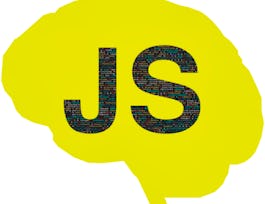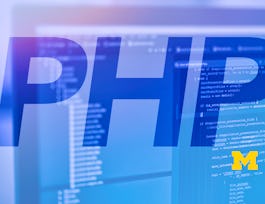Do you realize that the only functionality of a web application that the user directly interacts with is through the web page? Implement it poorly and, to the user, the server-side becomes irrelevant! Today’s user expects a lot out of the web page: it has to load fast, expose the desired service, and be comfortable to view on all devices: from a desktop computers to tablets and mobile phones.



Introduction to Javascript and Ajax: Building Web Apps
This course is part of HTML, CSS, and Javascript for Web Developers Specialization

Instructor: Yaakov Chaikin
Sponsored by Syrian Youth Assembly
2,582 already enrolled
(27 reviews)
What you'll learn
Fundamental and advanced Javascript programming concepts
How to interact with the Document Object Model (DOM)
How to handle user events with Javascript
How to create responsive and interactive websites with Javascript and AJAX
Details to know

Add to your LinkedIn profile
12 assignments
See how employees at top companies are mastering in-demand skills

Build your subject-matter expertise
- Learn new concepts from industry experts
- Gain a foundational understanding of a subject or tool
- Develop job-relevant skills with hands-on projects
- Earn a shareable career certificate


Earn a career certificate
Add this credential to your LinkedIn profile, resume, or CV
Share it on social media and in your performance review

There are 2 modules in this course
What fun would a web site be if there was no functionality to it? In this course, we are going to concentrate on learning the fundamentals of the Javascript language. A lot of even seasoned developers “tinker” with Javascript without really understanding how the language works. That leads to viewing the language as more of a nuisance instead of a powerful tool. That is why we are going to concentrate not only on the “how” but also on the “why”, so you are empowered by the Javascript language features, not confused by them. We’ll cover just about everything - from common language constructs and Javascript types to objects, functions, arrays, closures, and scope isolation.
What's included
23 videos4 readings9 assignments1 peer review
In this course, we are going to take all those newly learned Javascript language skills and learn how to utilize them within the context of a web page. We’ll start by learning how to properly manipulate the web page components using the Javascript Document Object Model API. We will then move on to learning one of the most popular ways of serving up data to a web site - Ajax. We'll learn about the protocol that the language of the web speaks in (HTTP), how to set up and handle Ajax requests and responses, as well as how to process JSON data. We'll finish the course by connecting our restaurant web site from Course 3 (Coding the Static Restaurant Site) to a real backend service that will allow us to pull the data for the restaurant menu dynamically from the server without having to reload the entire page.
What's included
17 videos7 readings3 assignments1 peer review
Instructor

Offered by
Why people choose Coursera for their career




Learner reviews
27 reviews
- 5 stars
74.07%
- 4 stars
11.11%
- 3 stars
11.11%
- 2 stars
3.70%
- 1 star
0%
Showing 3 of 27
Reviewed on Jul 27, 2024
It is good overall but the versions used are so outdated, I hope they put a year on when was this course published. Thanks Yaakov!
Reviewed on Aug 9, 2024
The real-workd projects were invaluable for translating concepts into real-world applications
Reviewed on Jul 24, 2024
Really awesome course, I recommend for anyone who wants to learn web development
Recommended if you're interested in Computer Science

University of Glasgow

University of Michigan

University of Michigan

Open new doors with Coursera Plus
Unlimited access to 10,000+ world-class courses, hands-on projects, and job-ready certificate programs - all included in your subscription
Advance your career with an online degree
Earn a degree from world-class universities - 100% online
Join over 3,400 global companies that choose Coursera for Business
Upskill your employees to excel in the digital economy



